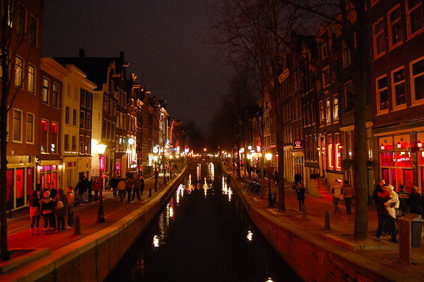Dutch prostitution experts divided on Amnesty decriminalisation plan
 Amnesty International’s decision to support the decriminalisation of prostitution worldwide has met with criticism and praise from Dutch commentators and experts.
Amnesty International’s decision to support the decriminalisation of prostitution worldwide has met with criticism and praise from Dutch commentators and experts.
Amnesty delegates voted to adopt a resolution that will allow the organisation to develop and adopt a pro-decriminalisation policy during their conference in Dublin on Tuesday.
The Volkskrant cites columnist Elma Drayer who said that ‘Amnesty has let itself be bamboozled by the sex workers’ lobby – an international kongsi of savvy happy hookers, self-proclaimed experts, woolly-thinking academics and feminists who have lost their way.’
Poverty
The supporters of the motion want to show that some people ‘decide’ to become prostitutes because of poverty or because they need money, she said. ‘They are implying these people are not victims but that they need empowerment.’
‘But would Amnesty do the same for “some individuals” who decide to sell a kidney for money?’ she wrote.’Or are they people who need empowerment too?’
Step too far
A complete decriminalisation of prostitution is also a step too far for Evelien Hölsken, director of aid group Free a Girl which works to stamp out forced prostitution.
This would let pimps and brothel keepers off the hook in countries such as India where thousands of young girls are forced into prostitution at a young age, she says.
‘But in the Netherlands too many women are victims of abuse and a complete decriminalisation will make people trafficking and forced prostitution worse,’ Hölsken told the Volkskrant. Amnesty also fails to address the responsibility of the men who use prostitutes. ‘Clients should be made punishable by law,’ Hölsken is quoted as saying.
Commercial sex
Ine van Weesenbeeck, senior adviser at sexual health organisation Rutgers, applauds the move. ‘What we want is a recognition that commercial sex exists (..) and that instead of a short-sighted repressive policy which will only make the reprehensible elements of prostitution worse, we come up with a realistic policy to improve safety for prostitutes,’ she told the paper.
Amnesty spokesman Ruud Bosgraaf said Amnesty is focusing on the attitude towards sex workers: ‘These people are living on the margins and are often discriminated against. Decriminalising their work strengthens their position. They can get a tax number, pay taxes, go to hospital without any problems.’
Mariske Majoor, a former prostitute and chairwoman of sex workers’ union Proud, is very happy with the move.
Working conditions
‘Amnesty sees how important good and safe working conditions are for sex workers,’ she is quoted as saying in Trouw. ‘In the Netherlands, prostitution is legal but because it’s still surrounded by an atmosphere of criminality the government is still bombarding us with rules and regulations.
‘If you want to want to film your bare bum on a webcam in your bedroom and make some money that way, you have to have a license. But journalists don’t have to ask permission to work from home, do they? There is still a lot that can be improved,’ Majoor is quoted as saying.
Thank you for donating to DutchNews.nl.
We could not provide the Dutch News service, and keep it free of charge, without the generous support of our readers. Your donations allow us to report on issues you tell us matter, and provide you with a summary of the most important Dutch news each day.
Make a donation